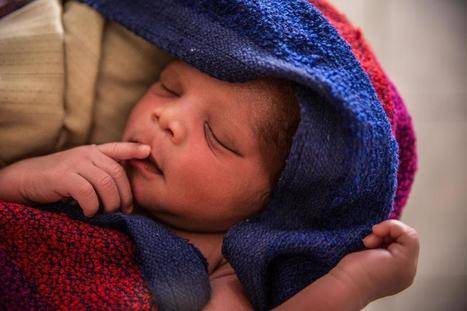Proving Again It’s Not Dollar-Centric, Blockchain Is Birthing Babies In Tanzania

The world’s first “blockchain baby” was born in Dar es Salaam, Tanzania, to reaffirm yet again that the technology is not all about the money. While the innovation has been used to issue cloud-based certificates and render related courses in some of the best universities around the world, blockchain also helps to battle charitable distribution in Africa and Ireland. This time, babies’ identities are being uploaded on the blockchain network.
Under the auspices of concerted efforts between Irish AID:Tech and Dutch PharmAcess, which contrived a project tailored to tackle controversies in the charitable sector as regards the fair distribution of donations, success have been recorded in what is a women’s aid initiative in Tanzania.
In a bid to track and support vulnerable women, the founders of these two groups tried leveraging blockchain to facilitate the delivery of aid and sharing of data, with the shared aim of implementing support.
Being that the blockchain is seemingly synonymous with crypto, there is much wonder what relationship the technology has to do with babies. AID:Tech discovered a humanitarian application of the blockchain to make possible a system that uses digital identity and the said technology to create a fresh and more transparent way for government, enterprises, and NGOs to deliver digital entitlements. Tailored to identify pregnant women and provide them with the care they need, the project was kicked off in July last year and records a trio of breakthrough.
According to a report, the goal of the initiative with blockchain technology was realized way faster as in a project for prenatal care, the collection of the medical records of underprivileged women’s medical data enabled the team to organize and provide them with proper medical care. Thanks to the tech, necessary attention for speedy recoveries were possible, as the system is alerted per the mother’s medical needs.
In what was a world’s first, the digital identity of a baby born in Tanzania was added to this digital ledger, making the infant entitled to imperative care and fund allocation that would otherwise prove difficult to track and source. Speaking of which, the first blockchain baby was delivered on 13th July 2018, which was shortly followed by a duo tech-protected siblings six days after.
According to Forbes, the projects afford each pregnant women a digital ID which is a guarantee to pregnancy vitamins such as folic acid. The ID also helps in tracking the women’s progress via data added to the blockchain. From registration to medical appointments down to delivery, the mothers are kept under close observation with the use of Nakamoto’s contrivance.
Tanzania’s healthcare system which faces a couple of challenges could be done one better as this project grows and finds ways to ensure that it keeps up with demand. With blockchain being young technology, it’s scalability still undergoes a variety of testing. Even though babies were not accounted for in Satoshi’s white paper, the traceability factor is indeed proving useful.
AID:Tech’s blockchain-enabled platform effectively allows for traceability of any entitlement that is documented therein securely and efficiently. Even with elemental setbacks such as fraud, collaborations, investments, and other efforts are being channeled into the maternal sector to improve and transform charitability one step at a time.